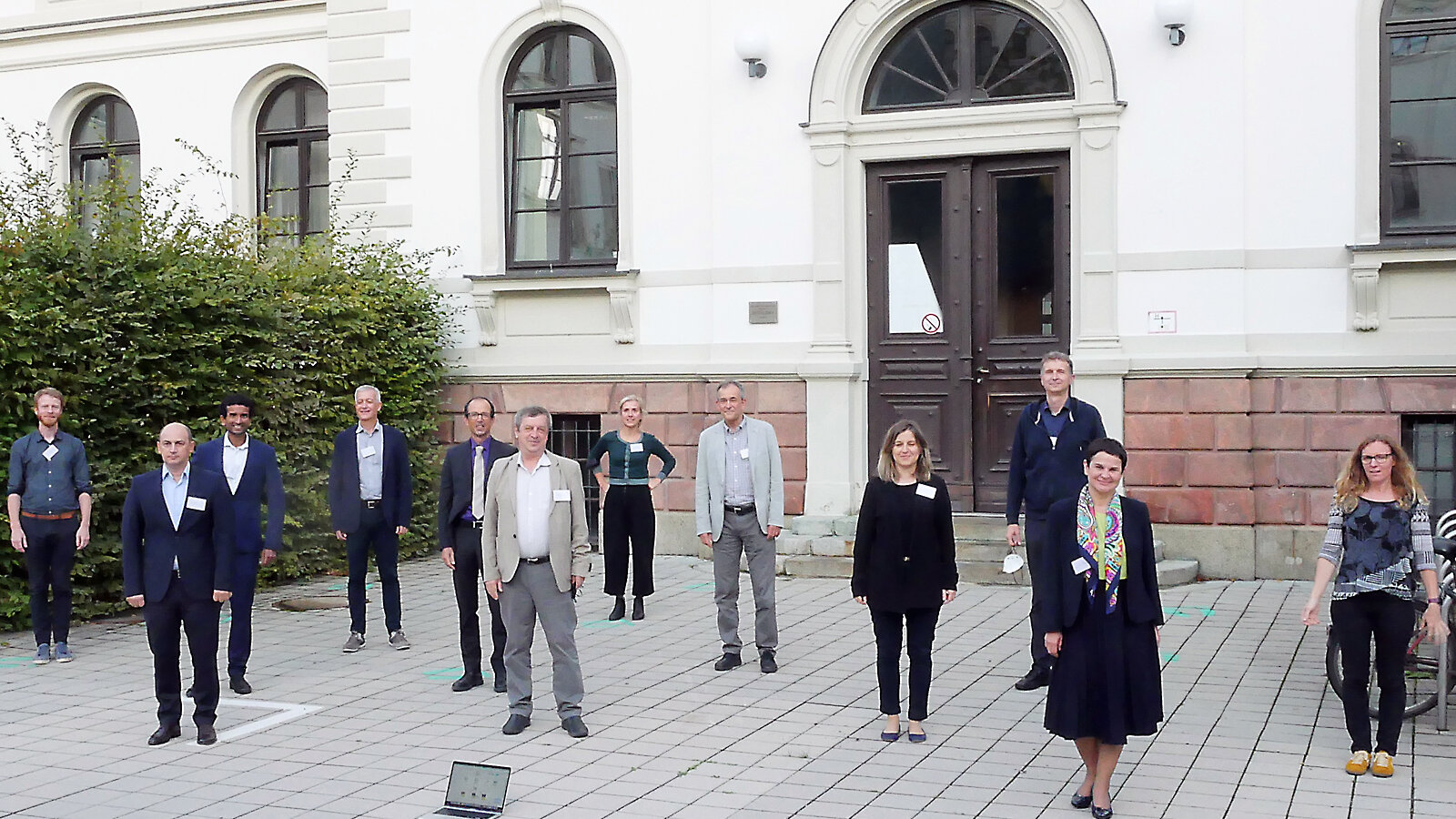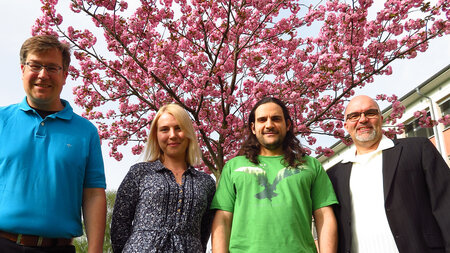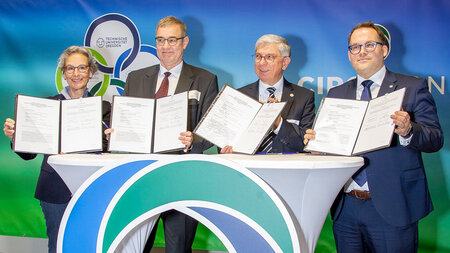A joint infrastructure in teaching and research is to pave the way for the UNIVERS alliance to become a European University
Strategy workshop of the seven partner universities in the alliance "UNIVERS - European Cross-Border University" at Chemnitz University of Technology laid the foundations for further joint development.
-

Representatives of the seven partner universities in the alliance "UNIVERS - European Cross-Border University" took part in the strategy workshop at Chemnitz University of Technology. In the picture (from left): Dr. Benny Liebold, Head of the International Office, Sorin Cazacu from the University of Craiova, Iswar Guiry from the University of Perpignan Via Domitia, Antoni Granollers from the Universitat de Lleida, Jonathan Pollock from the University of Perpignan Via Domitia, Radu Constaninescu from the University of Craiova, Ariane Korn, UNIVERS project coordinator at TU Chemnitz, Josep Calbó from the Universitat de Girona, Emilia Lićwinko, from the Bialystok University of Technology, and Prof. Dr. Maximilian Eibl, Vice President for Academic and International Affairs at Chemnitz University of Technology, Grażyna Jakimiuk from Bialystok University of Technology and Alicia Betts from Universitat de Girona. Not pictured but digitally participating were: Iveta Graudina, Jelena Lonska, Sandrine Canadas, Tsvetelina Harakchiyska, Dorota Krawczyk, Juliana Popova, Dan Selisteanu and Desislava Atanasova. Photo: Imke Leyk
Within the framework of the European higher education alliance "UNIVERS - European Cross-Border University", a strategy workshop was held for the first time at Chemnitz University of Technology. The most important topics of the meeting included explorations and basic discussions about joint study programs, the development of a common infrastructure for teaching as well as the establishment of a communication platform for all partner universities with the aim to develop reference programs in the fields of higher education, knowledge and technology transfer as well as value creation, which take into account the special circumstances and challenges in the cross-border area.
Representatives of the seven partner universities participated in the workshop. These include Politechnika Białostocka (Poland), Universitatea din Craiova (Romania), Universitat de Girona (Spain), Universitat de Lleida (Spain), Université de Perpignan Via Domitia (France), Rēzeknes Tehnoloģiju Akadēmija (Latvia) and Angel Kanchev University Russe (Bulgaria). In order that the workshop could be jointly designed by all participants under Corona conditions and to strengthen the identification as a university community within the UNIVERS network, it took place hybrid via an online platform.
Young people should be able to make valuable contributions to overcoming cross-border challenges
For closer cooperation in teaching, the participants agreed to develop concepts for joint study programs as a first step. Independent European master's degree programs and specific bachelor's modules on the topic of "Cross-Border Challenges" are to be developed later on. The program focus will be on the special legal, economic and social aspects in a cross-border context as well as the challenges of migration and the connections between culture, identity and origin. Graduates should be able to make innovative contributions to overcoming these "cross-border challenges" in border regions.
In order for young people to succeed in making valuable contributions to overcome cross-border challenges, the training of what are known as entrepreneurial skills is crucial in addition to knowledge transfer and inventiveness. These include skills in management, finance and strategic planning, as well as leadership and communication skills and the development of a start-up spirit. For example, UNIVERS has already held the European Cross Border Doctorial in July 2021. During this two week international competition interdisciplinary teams developed promising start-up ideas and presented them to an international panel of experts.
In addition, numerous physical and digital mobility opportunities for students and faculty between the participating partner universities will be offered as part of the planned study programs. The resulting cooperations are intended to strengthen the feeling of studying and teaching at a joint university entirely in the spirit of a European University.
Shared infrastructure for greater participation and academic community
For the implementation of such study programs, a European University is faced with the question of a common infrastructure for the exchange of knowledge and ideas as well as design and implementation possibilities. An essential component of this is a common "e-campus" i.e. applications for the organization and implementation of joint courses. Possible solutions for this were discussed, as was the networking of existing advisory and service offerings for studying and teaching at the partner institutions. The aim is to create an inter-university "community of practice" and pool experience.
In addition to a planned expansion of the UNIVERS alliance through new university partners in border regions, a stronger focus is to be placed on the topic of inclusion and inclusive teaching. The participants also discussed contributions of the UNIVERS network to the "European Green Deal" and the European digital transformation in terms of the new strategic framework for European educational cooperation (2021-2030). Further details are now to be worked out on this basis.
Background: UNIVERS - European Cross-Border University
All universities participating in UNIVERS have their location in border regions in common. They are already familiar with the resulting requirements and challenges for higher education: In regions close to the border, there is a significantly increased need for mobility for the common education area and labor market, which, however, is confronted with inequalities in the legal, social, and educational systems as well as cultural and language barriers. At the same time, according to a 2016 study by the European Research Network for Spatial Development and Territorial Cohesion, these so-called cross-border regions of the European Union comprise nearly 40 percent of the EU's land area, population, and gross domestic product. The regional areas of tension are thus becoming key challenges for the European Union.
With the motto "building collaborative leadership for cross-border territories," the goal of UNIVERS is to overcome these borders and form a common European educational space with nearly 85,000 students and 6,700 employees. In doing so, UNIVERS will serve as a model for other cross-border regions in Europe and beyond, which can benefit from the solution strategies developed.
For additional information on UNIVERS, please contact Dr. Benny Liebold, Head of the International Office at Chemnitz University of Technology, Phone: +49 371 531-38543, E-mail: benny.liebold@iuz.tu-chemnitz.de.
(Author: Imke Leyk / Translation: Sai Teja Paila)
Matthias Fejes
22.10.2021





